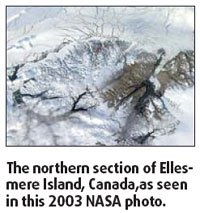
In the latest sign of the accelerating climate change, a huge ice shelf has broken away in Canada's northern Arctic, and the remaining shelves have shrunk at a "massive and disturbing" rate.
The 55-sq-km Markham Ice Shelf, one of just five remaining ice shelves in the Canadian Arctic, split away from Ellesmere Island in early August, Canadian scientists said on Tuesday.
Two large chunks totaling 76 sq km have broken off the nearby Serson Ice Shelf, too, reducing it by 60 percent, the said.
"The changes ... were massive and disturbing," said Warwick Vincent, director of the Center for Northern Studies at Laval University in Quebec.
Temperatures in large parts of the Arctic have risen far faster than the global average in recent decades, which experts said was linked to global warming.
"These substantial calving events underscore the rapidity of changes taking place in the Arctic," said Derek Mueller, an Arctic ice shelf specialist at Trent University in Ontario.
"These changes are irreversible under the present climate and indicate that the environmental conditions that have kept these ice shelves in balance for thousands of years are no longer present," he said in an e-mailed statement from the research team.
Mueller said the total amount of ice lost from the shelves along Ellesmere Island this summer was 134 sq km, more than three times the area of New York's Manhattan island.
The figure is more than 10 times the amount of ice-shelf cover that scientists estimated on July 30 would vanish from around the island this summer.
"Reduced sea ice conditions and unusually high air temperatures have facilitated the ice shelf losses," said Luke Copland of the University of Ottawa.
"Extensive new cracks across the rest of the largest remaining ice shelf, the Ward Hunt, mean that it will continue to disintegrate in the coming years," he said.
The first sign of serious recent erosion in the five shelves came in late July, when sheets of ice totaling almost 13 sq km broke off the Ward Hunt shelf. Since then that shelf has lost another 14 sq km.
Ellesmere Island was once home to a single enormous ice shelf of about 5,633 sq km. All that is left of that shelf today are the four much smaller shelves that together cover a little more than 483 sq km.
Scientists say the ice shelves, which contain unique ecosystems that had yet to be studied, will not be replaced because they had taken so long to form.
The rapid melting of ice in the Canadian Arctic archipelago worries Canada, which fears foreign ships might try to sail through the waters without seeking permission first.
(China Daily September 5, 2008)